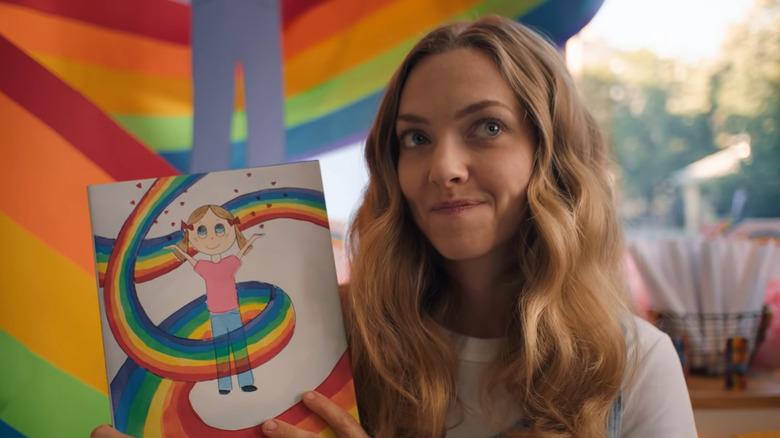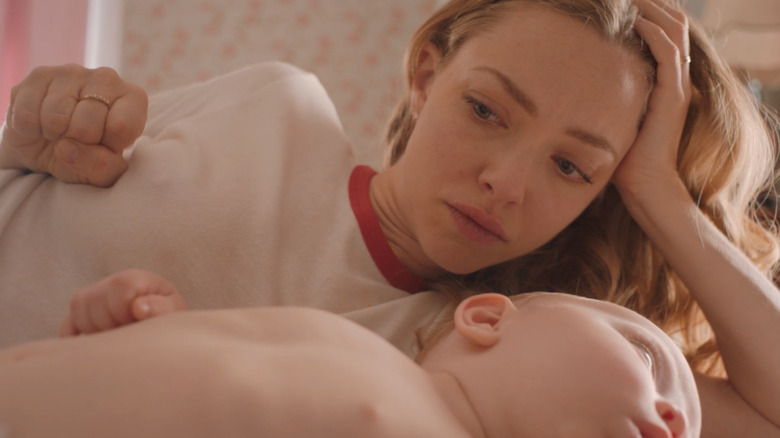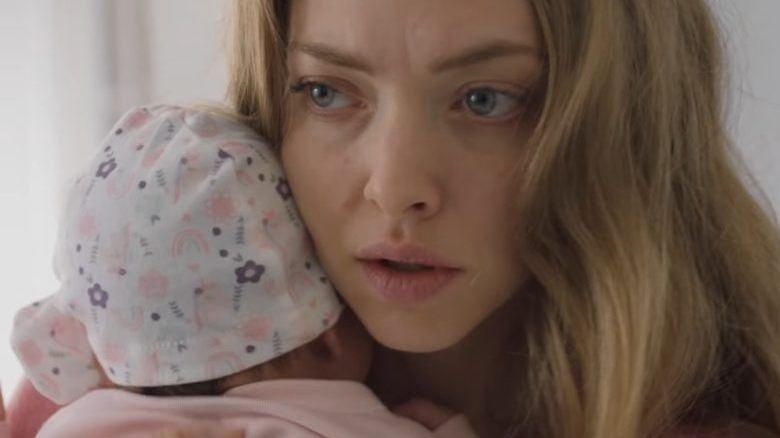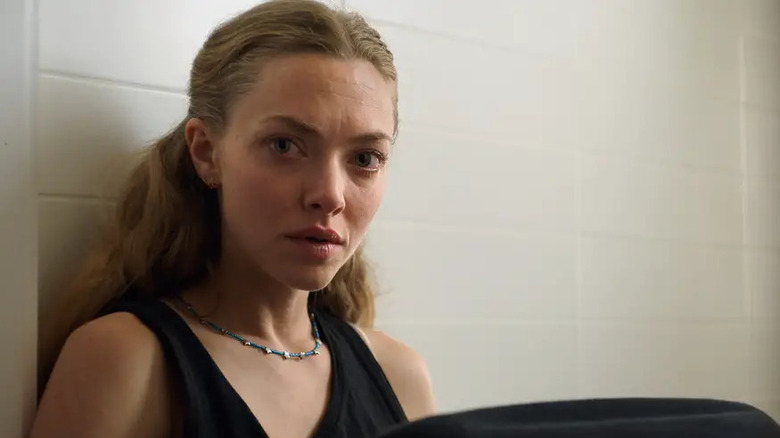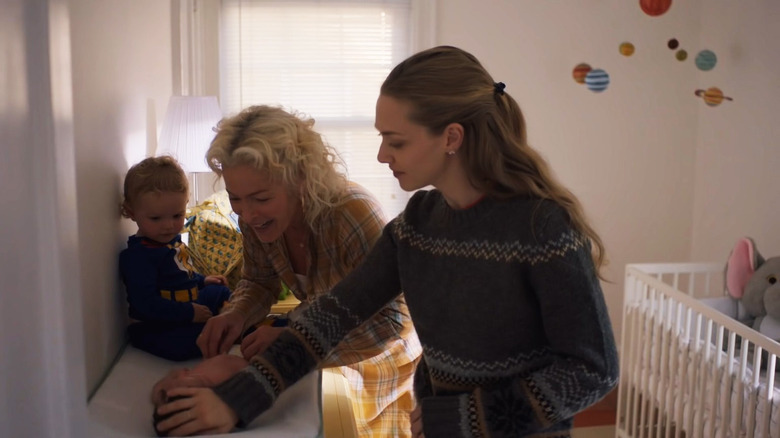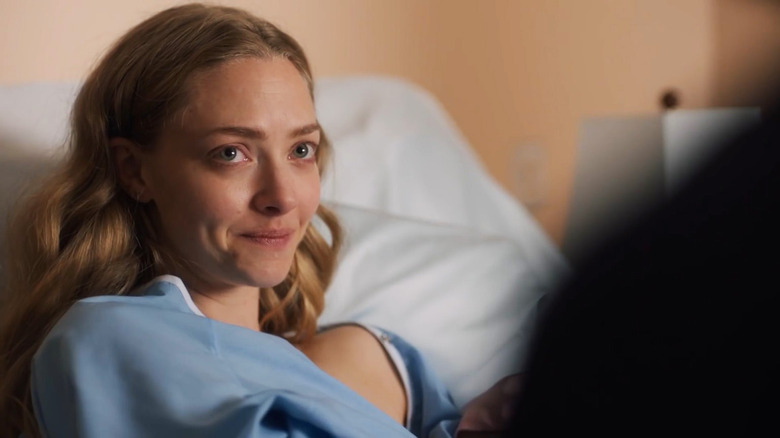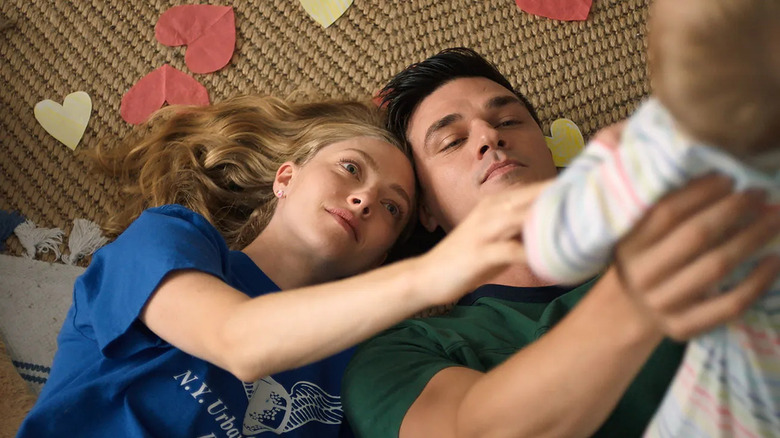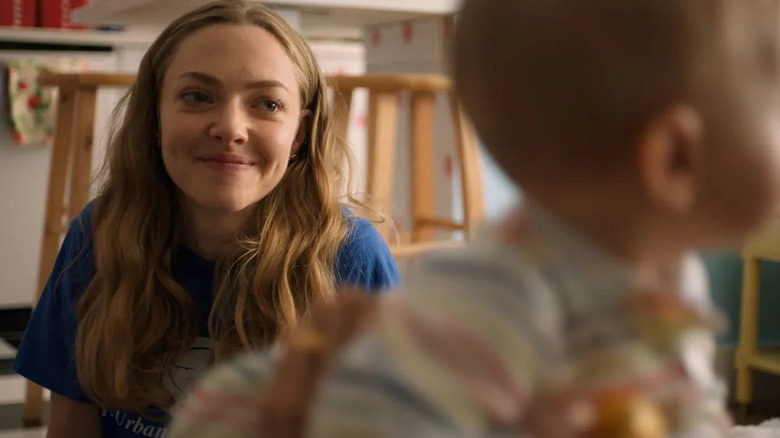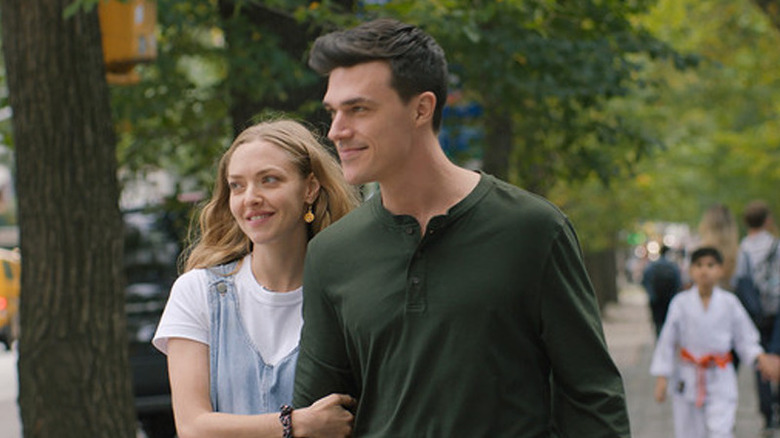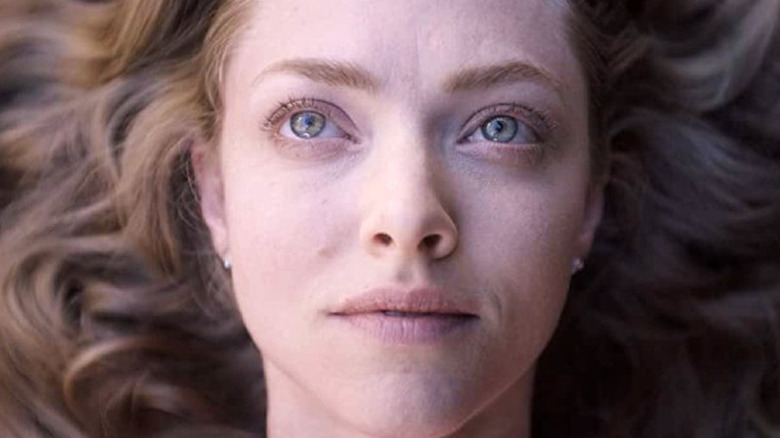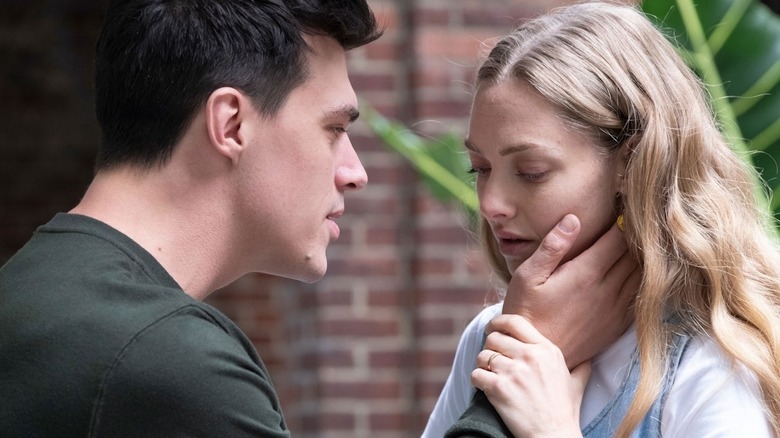The Ending Of A Mouthful Of Air Explained
We may receive a commission on purchases made from links.
Although it features a talented cast and some gut-wrenchingly real depictions of depression and anxiety, "A Mouthful of Air" likely slipped under a lot of viewers' radars. The film — based on the 2003 novel of the same name by the film's writer-director Amy Koppelman — follows Julie (Amanda Seyfried), a children's book writer who struggles with depression and her own sense of self-doubt as her son's first birthday approaches. Eventually, Julie is unable to fight against her own darkness and attempts to take her own life, but fails. As she recovers, she's forced to deal with her own lingering feelings and the reactions and pain seen in those around her that stem from her lowest moment.
"A Mouthful of Air" is an experience that touches on some very dark levels of depression through Seyfried's incredible performance, leaving viewers on the verge of tears at times. Julie's story isn't afraid to explore the often unseen perspective of someone battling depression and touches on the stressors of being new parents. It's a film full of tender emotion that hits hard at times and constantly builds all the way towards its gutting finale. Plus, a lot of what the film shows fits perfectly with the growing conversations around mental health and increasing awareness of the issues surrounding it. So let's delve into the ending of "A Mouthful of Air" and look at its relevant themes.
What you need to remember about the plot
Before we get into the film's finale, let's look at the most important aspects of the film that play a role in the ending. After Julie is saved from taking her own life, she's left in a strange position that doesn't help her express her issues. Everyone around her — including her husband Ethan (Finn Wittrock) and her mother (Amy Irving) – struggles to understand what Julie is going through, often leading to conflict. Julie herself continually feels trapped in this state of anxiety that stems from her own self-doubt and her worries of being incapable as a parent. Along with her belief that her "inner ugliness" will cause Ethan to leave her, Julie is afraid that she won't be able to protect their son Teddy and that he'll get hurt because of her.
Julie's fears as a parent are heightened when she discovers that she's pregnant. As her due date approaches, Julie is once again filled with anxiety and even starts to have flashbacks to her traumatic upbringing with her father (Michael Gaston). Their broken relationship still haunts her and is likely a key factor in her own fears as a parent. Julie and Ethan are also at odds when Julie rebels against taking her medication, and their fighting carries through the birth of their daughter. However, their relationship doesn't fracture and it seems like things will be okay – until an unexpected guest arrives at their door.
What happens when Julie's mother comes to help
Although Julie is concerned about what color to paint their daughter's bedroom, Ethan finds a fun way for them to settle on a color and help ease her tension. Just as she's about to start painting, her mother arrives to help her. But when Julie opens the door, she finds that her mother didn't come alone and has actually brought her father along. Julie is frozen in fear the second she lays eyes on her father and unhappily asks her mother if she really let him back into their lives. In an earlier flashback, Julie's relationship with her father is shown to be incredibly turbulent. Although there are nice memories of them being together, there are also moments that show how cruel and abusive he could be towards her.
Reluctantly, Julie lets her father into her house to help her paint. When Julie eventually joins him, he tries to act like a father towards her again — giving her advice about paint brushes from the hardware store and teaching her the correct way to paint effectively. While her father is guiding her hand, he notices the cuts on her wrists from when she tried to end her life. The guilt of his own actions overwhelm him and he starts to break down and apologize to Julie. However, Julie's face throughout the entire sequence is stone cold and without feeling toward him.
What happens at the end of the movie
Julie's interaction with her father might not be chaotic, but it clearly unearths her anxiety and depression. When we see her next, she's playing with her two children in the backyard. While things are initially going fine, Julie is eventually stretched to her limit. Once her baby daughter starts crying, she's forced to leave Teddy outside — which is her worst fear since she can't protect Teddy if something happens. Eventually Julie is able to gain control of the situation but her sense of worry only grows.
When Ethan returns home, he's at least able to take Teddy off her hands and partially relieve her stress. However, it's not enough and the events of the opening start to play out again. As a voiceover of Julie reading her story to Ethan plays over the scene, Julie pulls some of her drawings down and starts to bind them into a book. Then Julie puts her daughter into her crib, grabs a box cutter, and heads outside. Although the film never shows her actions, Ethan's reaction makes it clear that she has taken her own life. This time though, there's no one to save her and the film concludes on a flash-forward that sees an older Ethan and their children celebrating the birth of a new baby. Julie and Ethan's daughter Rachel is given Julie's book and the film ends on the illustrations of the book's protagonist looking up at the stars.
What does the end of the movie mean?
Although Julie seems perfectly happy and content in her life when we first meet her, we quickly find out that she's silently suffering. It's not that she's unhappy in her marriage or hates being a mother to their new son Teddy. Rather, she's simply suffering from deep-seated anxiety and depression that's constantly causing her unbearable stress. Julie is in a constant state of uncontrollable worry about the safety of her relationship and the safety of their son, and often believes that this inner ugliness will drive people away — similarly to how it's driven away her father. Despite being put on medication after her initial suicide attempt, these feelings linger and eventually cause her to go through with her intentions of self-harm.
Julie is really an embodiment of depression and anxiety that many go through and sadly struggle with on a daily basis. There's no clear cause that's easy to fix nor a simple cure — which is why Julie and Ethan's relationship faces harsh turbulence through this process. Even Julie's psychiatrist (Paul Giamatti) describes the feeling as pain that's so resilient and deafening that many will eventually feel that death is the only escape. Julie's story represents the lasting damage of depression, and it's an incredibly relevant perspective as we further discuss mental health more openly.
Another explanation
Although there is no clear cause of Julie's lingering depression and anxiety, her upbringing could be easily perceived as the focal point. In some flashbacks to her childhood, Julie initially seems happy as she plays with her father. However, we come to realize that her father displayed some abusive behavior towards her that's caused deep-seated trauma. It's so bad that Julie rarely wants to talk about him and doesn't show the same kind of yearning for him to return that her mother does. That's why she's completely stunned when she has an unwanted reunion with her father and he attempts to "fix" their broken relationship.
The pain — both emotional and physical — that Julie dealt with as a child is likely still afflicting her as an adult and it's a big reason that she has such major concerns for herself as a parent. There's a part of her that doesn't want to become her dad, a huge factor in her worry and anxiety for her children. The unresolved nature of Julie's issues with her dad also probably play a role in her ongoing depression. Julie's persistent anxiety and depression is a subtle but strong indication of how family trauma can continue through different stages in life.
The stress of being a new parent
Julie's story in "A Mouthful of Air" is an eye-opening display of what can go through the mind of a new parent. While movies and the general culture of being parents can make having kids come off as this magical, near-perfect experience, that's not the case for most people. Honestly, most deal with their own personal struggles and it's what makes Julie's perspective so relatable and real. When she's telling Ethan about her worries that their daughter won't like her or the way she looks, it's a valid concern that most would have. When you're about to have a kid, you genuinely want them to unabashedly love you and the mere thought of them not liking you will constantly eat at you.
Even Julie's concerns about the color of her daughter's room aren't shocking, and reflect how parents genuinely want everything to be perfect for their child as they enter this world. This heightened sense of perfection mixed with Julie's equally strong anxiety, stemming from her fears of something bad happening to Teddy, is a mortifying combination for Julie. Her story is a powerful reflection of the stressors and perspectives of new parents, making it somewhat of a cautionary tale.
The complicated nature of depression
"A Mouthful of Air" also offers an important perspective on the complicated nature of depression and the ripples and fractures it can cause in relationships. After Julie recovers from her suicide attempt, she is forced to deal with the fallout of her actions. Ethan's sister (Jennifer Carpenter) openly criticizes Julie while they're out at a bar and demands answers. Both Ethan and Julie's mother struggle to figure out exactly how to understand what's happening with her, leading to conflicts and misunderstandings. Julie and Ethan's relationship especially suffers from this, as a frustrated Ethan is unable to grasp what Julie is going through or comprehend her refusal to take medication or fully explain her feelings.
However, it's hard to blame Julie for being difficult to read because she can't even fully understand what's happening. She knows her pain stems from her increased feelings of self-doubt about her parenting and general worth, but can't seem to escape it. In some ways, she's lived with this pain for so long that she's become too accustomed to putting on a smile and pretending that things are fine when they're not. Not to mention, it's hard for her to speak about what she's feeling when she sees that she's being treated differently after what happened. All of this makes the film's depiction of anxiety and depression crushingly real, and it displays how complicated tackling depression can be incredibly well.
The need for a different approach
Perhaps the biggest takeaway for viewers from Julie's story is that we need to change our approach and mindsets regarding both new parents and people struggling with their mental health. The film makes viewers recognize the stressors and anxiety that can come with being a new parent and how others perceive and treat people going through those struggles. Along with films like "False Positive" — about a woman who believes something sinister is tied to her pregnancy — "A Mouthful of Air" touches on some of the ways that the concerns of new parents get discredited and discarded by others. Although they never say "postpartum depression" in the film, Julie's worries are subtly chalked up to that by others, and it's a big reason that people like Ethan and Julie's mother struggle to really understand Julie's issues.
Their lingering sense of worry and growing concern for Julie might be understandable from their perspective and that of others, but often causes Julie to become more distant. "A Mouthful of Air" is undoubtedly a cautionary tale for how we treat people going through major mental health issues and/or turbulent times. It's a reminder of how raw and complicated anxiety can be and how it can't be summed up in simple terms — but rather needs to be dealt with in a more meaningful, genuine fashion.
What does the ending mean for a sequel?
It's standard nowadays to wonder whether a film can be followed by a sequel or even turned into a franchise. With "A Mouthful of Air" though, that question doesn't really need to be asked since there's probably not going to be a follow-up film. The movie did not perform well at the box office nor was it touted by critics highly enough to warrant a sequel. Even in terms of the film's narrative it wouldn't make much sense for there to be more.
The film ends with Julie taking her own life and the memory she left for her family through the book she made for Rachel. There isn't much room for the story to continue and Amy Koppelman hasn't written another book in this world. There could be a potential way to pick up the narrative if a sequel intended to focus on Julie and Ethan's kids growing up without their mom and their lingering feelings following her death. However, there isn't much of a chance of that happening, so "A Mouthful of Air" is likely a one and done situation.
What's the legacy of the film?
Given that it came out only a couple of years ago, "A Mouthful of Air" hasn't garnered much of a legacy. But it does feature important themes that make it continue to be relevant. With the conversations around mental health ongoing, "A Mouthful of Air" features important perspectives related to that subject and even has a unique angle in that it touches on the stress of being a new parent. It can be a harsh film, but it also presents thought-provoking moments that can add to our awareness of how we talk to people struggling with their mental health.
The film could also add to Amanda Seyfried's acting legacy as well, since her performance was highly touted when the film was released. Despite the movie getting a mixed reception from critics, Seyfried's performance was seen as a bright spot for the way she made Julie's story so captivating and heartbreaking. Although it hasn't been around long enough to achieve any kind of loyal following or re-appreciation, "A Mouthful of Air" shows a lot of potential to be talked about for years to come.
"A Mouthful of Air" is available to rent or purchase on Amazon Prime Video.
If you or anyone you know needs help with mental health issues or depression, is in crisis, or may be the victim of child abuse, contact the relevant resources below:
- Contact the Crisis Text Line by texting HOME to 741741, call the National Alliance on Mental Illness helpline at 1-800-950-NAMI (6264), or visit the National Institute of Mental Health website.
- Call or text 988 or chat 988lifeline.org
- Contact the Childhelp National Child Abuse Hotline at 1-800-4-A-Child (1-800-422-4453) or contact their live chat services.
